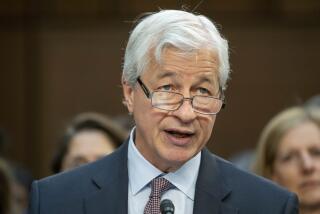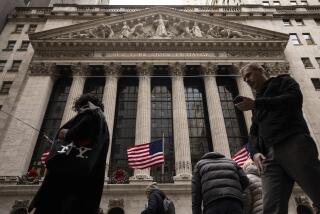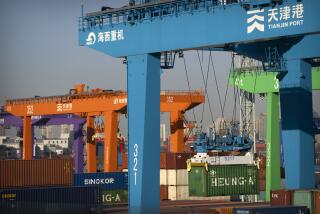War Can Mean Money in the Bank : Economy: Don’t believe predictions that the Gulf conflict will further depress the U.S. economic picture--previous wars prove otherwise.
White House officials estimate that the Gulf War now costs about $600 million a day. If this continues through March, the total cost in the year’s first quarter will exceed $50 billion, an annual rate equal to 4% of gross national product.
It surprises us therefore to read in more than a few places that a war lasting several months will prolong and deepen the economic downturn. The experience of history suggests just the opposite.
World War II, the Korean War and the Vietnam War all caused a sharp rise in real GNP. In the first year of World War II, real GNP rose a startling 18%. At the start of the Korean War, real GNP jumped from no growth in 1949 to 8.5% growth in 1950. And the Vietnam War saw real GNP growth rise from a rate under 3% in the early 1960s to nearly 6% in 1965 and 1966.
It’s easy to see why national income increases during wartime. Government spending on military equipment and supplies stimulates the economy directly. Of course, the entire cost of the Gulf War will not be reflected in new production in the United States. Some military needs like fuel will be met on site in Saudi Arabia. Some equipment and supplies taken from Defense Department inventories will not be replaced. But there is bound to be a net increase in production in the United States and the more so the longer the war lasts.
Increased military production will create new jobs that offset some of the current slack in the labor market; if the war lengthens, firms will hire new employees to replace reservists called up. The historic record shows that unemployment rates dropped sharply during each of the past three wars, falling by half during the Korean War and from 6% in the early 1960s to 3.5% during the Vietnam War.
Beyond these direct impacts on demand, there is a less certain indirect effect through consumer behavior. In the last three wars, real consumer spending rose sharply. Although shortages of consumer durables reduced spending on big-ticket items during World War II and the Korean War, overall consumer spending continued to rise as each war continued.
Although consumer confidence plunged after the Iraqi invasion and the jump in oil prices and is still depressed by bleak economic news, there is no reason to expect consumer confidence and spending to be depressed by the war itself. Public confidence in the successful outcome of this war cannot be any less than in World War II, Korea or Vietnam. Why should consumers be any more self-denying now than in past conflicts?
But there are two special features of the Gulf War: cost sharing with our allies and the potential for oil price increases.
An unusual feature of this conflict is that several key allies, notably Germany, Japan and Saudi Arabia, have agreed to reimburse the United States for a substantial portion of war costs. But while these payments will help to reduce the government’s 1991 budget deficit, they will have almost no effect on U.S. real economic activity this year. U.S. production will increase with or without cost-sharing.
Although the allies’ contributions may be earmarked for specific outlays, the net effect of these payments will be to allow the U.S. government to reduce its outstanding debt to those countries.
Finally, this war is different because of oil. Before Jan. 15, many bet that a prolonged war would hurt economic recovery because the price of oil would rise, thus depressing real incomes and spending. But oil prices since the war began have done just the opposite. The price fell sharply, from more than $30 a barrel to about $22 within the first day of fighting; it has stayed at that relatively low level. The allied superiority in the air has apparently reassured the markets that there will be no significant disruption of Saudi oil production. While there can never be certainty that the price of oil will continue to be low, at this level the war has already provided a stimulus to the economy.
The path of the American economy in 1991 is likely to depend much more on the actions of the Federal Reserve than on the duration of the Gulf War. But the persistence of the war is likely to accelerate the recovery if the price of oil does not rise substantially.
We should all hope for a successful conclusion of the war as quickly as possible, but we shouldn’t be afraid of the economic consequences if it takes a few months to get the job done.
More to Read
Get the L.A. Times Politics newsletter
Deeply reported insights into legislation, politics and policy from Sacramento, Washington and beyond. In your inbox three times per week.
You may occasionally receive promotional content from the Los Angeles Times.






